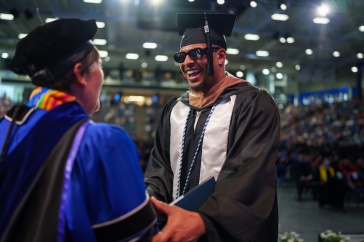
As universities evolve, so do alumni associations. How is the UNH Alumni Association’s role changing?
I think universities are challenged with this question. Are we connecting with alumni for life? Are we a partner in these people’s lives beyond their time here? Are we connected to their family lines and legacies? And also, are we connected to the place they’re in — are we part of our state’s economic development, our region’s economic development, our country’s economic development? And are we contributing to the knowledge base and social well-being of the world? The world is so small now, and for alumni associations, alumni are a piece of the pie. They have friends and family, and they’re all connected, and our challenge is to create a connection that’s meaningful across their lifespan.
What are some of your own memories?of being a student at UNH?
I was a student on both the Manchester and Durham campuses, and I was part-time for a period and ended up being a full-time student. I spent more than 10 years as a student here … and I’ve been on campus now for around 30 years. (McGrath is an associate professor in the department of health management in policy, College of Health and Human Services, and also founder and director of the university’s graduate program in analytics.) As a commuter student, I experienced a very different UNH than I do now — I spent a lot of time in the MUB and at the library. But the big connection for me was … that my program really mattered to me, the small, close-knit relationships I really had with faculty. I was in a lot of graduate programs after this and never felt that sense of family I felt at UNH. Even though the campus is big, it’s intimate. That stood out quite a bit and it hasn’t changed.
You’ve described yourself as a “data geek before it was cool.” How can looking at data help keep alumni connected?
There are a lot of things we could do that would be more valuable to alumni if we understood what our alumni value.
If they’re mid-career or early-career, maybe they need events that are more networking based. Or if they’re younger, maybe they want something more social. We’d love to use data to understand why alumni love this university, what connects them to it, and how to provide access to those things. When people move into new jobs, maybe we can provide low-cost job training or open access courses. Or maybe if they love athletic events … we can maybe provide customer loyalty things we don’t do now. If they volunteer, we could find a way to recognize them. We’re doing a little bit of it, but we could do more.
Along with being a data geek, you’re also a foodie. Why do you enjoy cooking? And do you have a favorite dish?
I was trained in French cooking techniques, so I like butter and all those really bad things for you. But the thing I enjoy most about cooking is the connection to this community, in Portsmouth, where I live, and the rest of the area. Between the farms and the restaurants and the chefs, there’s such a tremendous community that I don’t think is anywhere else. I don’t cook for myself — I like cooking for people and what it brings out in people.?
As the board’s new president, do you have a message for UNH alumni?
Remember why UNH matters to you, and why this place is so special, and then talk about those things — with friends and family, or with us. Participate with us, whether it’s an event near you or online, or here on campus. I always tell graduating seniors, “You’re graduating, but you never really leave.” This place will always be your home and we’ll always be your family. We’re here for you, and we’d love to see you again.
?
Originally published in?UNH Magazine Fall?2016?Issue
Comment on this article.
?
-
Written By:
Larry Clow '12G | UNH Cooperative Extension




















































